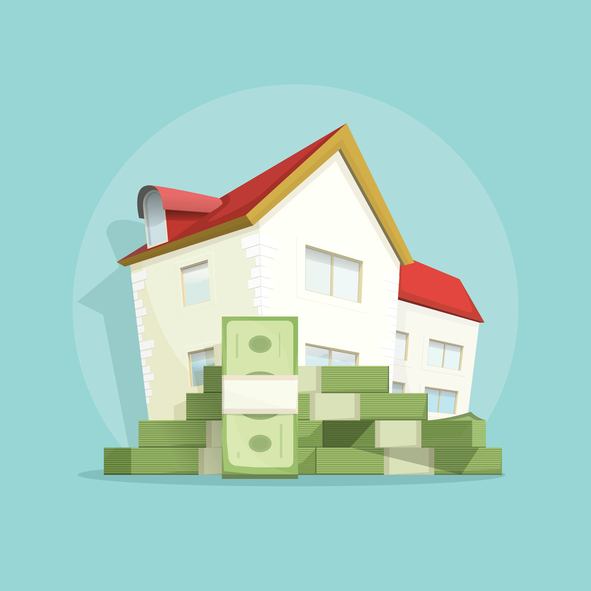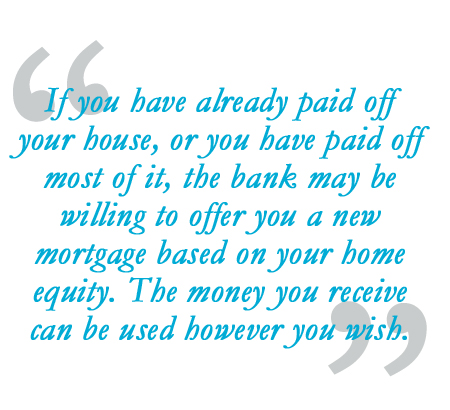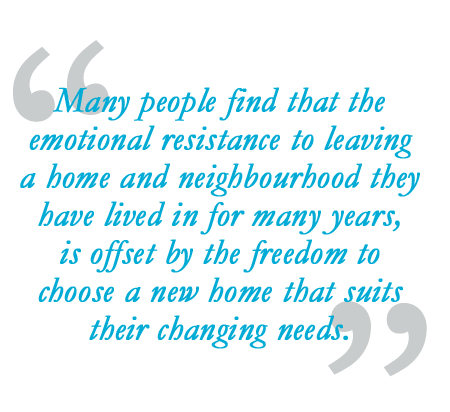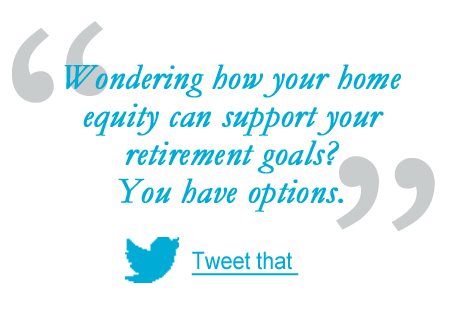By Christine Williston, B.A., FPSC Level 1®
 For older Canadians, with a paid or almost paid mortgage, ever increasing home values feels like watching winning numbers come up in the lottery. But how best to cash in the ticket? Or should it even be cashed in at all? The answer of course, depends on individual circumstances.
For older Canadians, with a paid or almost paid mortgage, ever increasing home values feels like watching winning numbers come up in the lottery. But how best to cash in the ticket? Or should it even be cashed in at all? The answer of course, depends on individual circumstances.
The optimal financial scenario for anyone approaching retirement is; a good pension, substantial savings, solid investments, and a mortgage free home. But quite often, life falls short of optimal scenarios. Many people arrive at retirement age, living in a very valuable asset, but with limited cash flow to live the way they imagined. This is often referred to as being house rich and cash poor and it can be quite a challenge to decide how (or if), to access that equity. But before you make any decisions, it’s important to have clarity on your situation.
Things to consider:
- How much have you accumulated in RSPs, TFSAs or other savings vehicles?
- What sort of investment portfolio have you built?
- What sort or pension can you expect from your employer?
- How much can you expect from CPP and OAS?
A mistake many people make is assuming more income from CPP and OAS than they will actually receive. As of 2017 the maximum annual payout for CPP is $13,370 and for OAS it’s $6,942.36. Few people collect the maximum. The average Canadian receives a little more than $640 a month from CPP ($7680 annually). OAS is clawed back at 15 cents on the dollar if your annual income is over $74,788.
If, after crunching the numbers, you realize that your retirement income won’t allow you to live the way you expected or dreamed of, there are three common ways to tap into your home equity:
- Borrow against your equity for your retirement expenses
- Downsize to access your equity
- Borrow against your equity to invest, before you retire.
Each has pros and cons, so speaking with a professional advisor would be a recommended first step, but let me give you a brief overview of each approach.
Borrow Against Your Home Equity to Fund Expenses in Retirement
There are three ways to use your home equity for expenses while still living in your home.
- A new or second mortgage
- A home equity line of credit
- A reverse mortgage
Most people are familiar with a second mortgage or home equity line of credit, but here is a quick refresher:
If you have already paid off your house, or you have paid off most of it, the bank may be willing to offer you a new mortgage based on your home equity. The money you receive can be used however you wish. Like all mortgages, you would have monthly principal and  interest payments until it is repaid.
interest payments until it is repaid.
With an equity line of credit, you are granted a certain amount of money (based on your income, credit score and debt ratios), but instead of a lump sum deposited in your account, as it would be with a mortgage, you have access to the amount as you need it. The same way you would use a credit card. And like a credit card, you are only required to pay the interest each month. Paying interest only is never the best idea, but lower minimum payments does give you more cash flow flexibility than you would have with a fixed mortgage payment.
The downside to these two options is having monthly payments to worry about, not an ideal situation in retirement. And depending on your other assets and income, the bank may not be willing to offer you either of these choices if they aren’t confident in your ability to repay.
Which brings us to the reverse mortgage. If you are not eligible for a mortgage or equity line of credit, or if you are concerned about monthly payments, HomEquity Bank offers the Canadian Home Income Plan (CHIP) reverse mortgage to Canadians 55+ years old. They are currently the only active reverse mortgage providers in Canada, but you can apply through most banks, mortgage brokers, investment advisors and other financial professionals, who will then be paid a referral fee.
Simply stated, a reverse mortgage gives you access to the equity in your home without having to make monthly repayments.
Some benefits of a reverse mortgage include:
- Receive up to 55% of your home’s value in tax free cash
- You do not make any payments as long as you or your spouse live in the house
- Because it is tax free it won’t affect your CPP or OAS payments
- Interest accrues monthly, but the total amount you can owe is capped at the value of your home
But there are pitfalls, like:
- It is more expensive to access. You will have to pay application fees, home appraisal fees, and lawyer fees. Overall, costs could reach as high as $2500, which will be deducted from the principal you receive from the CHIP.
- You will have the option of making repayments along the way, but you may be subject to large penalties to do so.
- High interest rates mean you will likely eat up most or all the equity you have in your home, reducing your estate for your beneficiaries.
- While HomEquity offers “up to” 55% of your home’s value, the actual amount you will be eligible for depends on factors such as, location, type of home, and how much other debt you have.
When choosing any of the above options to access your equity, it’s important to take your age, health and long term retirement needs into consideration. I strongly recommended that you obtain professional advice before moving forward with a reverse mortgage.
Downsize Your House
Selling your home and buying or renting a smaller home has many financial benefits, especially if you are mortgage free and living in one of the booming real estate markets. But even Canadians living in quieter markets have a lot to gain from downsizing. The amount you may get for your home, even if you’re not mortgage free, can be substantial and positively impact your retirement lifestyle.
If your kids have grown and moved out on their own, you may have much more house to maintain than you need. Downsizing will not only free up your home equity; it will likely lower many other expenses, like heating and cooling, insurance, property taxes and general maintenance which can make a huge difference to your monthly cash flow. A smaller living space can also be easier to manage as you age and have less energy for housework and climbing stairs. Of course, selling a house comes with expenses of its own, (repairs/updates before selling, agent fees, lawyers, moving costs) so that needs to be considered when crunching numbers.
 Many people find that the emotional resistance to leaving a home and neighbourhood they have lived in for many years, is offset by the freedom to choose a new home that suits their changing needs. They no longer need to live close to employment or near schools, and as many of their friends begin to downsize, the idea becomes even more appealing.
Many people find that the emotional resistance to leaving a home and neighbourhood they have lived in for many years, is offset by the freedom to choose a new home that suits their changing needs. They no longer need to live close to employment or near schools, and as many of their friends begin to downsize, the idea becomes even more appealing.
But while the decision to sell may come easily, determining if the next step should be buying or renting can be more complex. Again, getting professional advice is a good idea. The decision will be affected, at least in part, by your age and health. If you think either of those factors will affect how long you will live independently, then the costs associated with buying, then selling a new home, probably make renting a more viable option. But that will also depend on rent costs and availability versus buying in your preferred location, so there is never one set-in-stone answer.
If you are downsizing in your 50’s or 60’s, and in good health, purchasing a smaller home or condo is probably a good investment. You won’t be subject to rent increases or bad landlords, and you will likely build more equity in this new home.
The idea behind downsizing is freeing up your assets, but what you do with those assets has to be part of your retirement plan. Should you invest the money? Should you use it to supplement your other retirement income? Was your plan to help your children now, instead of leaving your home in your estate? Working with a professional will help you ensure you make the most of your money.
Borrow against your equity to invest, before you retire
 If you want to invest, but are frustrated that your funds to do so are limited; using equity in your home may seem like a great option. And it can be if your ROI is higher than the interest rate on your home equity credit line. But investing has no guarantees.
If you want to invest, but are frustrated that your funds to do so are limited; using equity in your home may seem like a great option. And it can be if your ROI is higher than the interest rate on your home equity credit line. But investing has no guarantees.
You could consider funding RRSPs, TFSAs or non-registered investments, keeping in mind that only interest on funds invested in taxable non-registered investments is tax-deductible. I strongly suggest you speak with a financial professional, who can help you assess the risks to your long term financial goals, before you borrow against your home. This is a much higher risk option than most people should take.
Consider all your options
Your home can be an amazing asset if you are clear on your needs and have a plan to make your equity work for you. The housing market is hot right now in many places across the country, but may not always be that way. Acting too impulsively or too slowly could have negative effects on your retirement. A clear-eyed assessment of your options in conjunction with a well thought out retirement plan is the best option for anyone feeling house rich and cash poor.
We hope this article has been helpful and provided some practical advice on how you can improve your financial well-being. If you need additional support, please contact one of our Money Coaches today.



I did appreciate your honest statement on this article. It is very useful to me and my future decisions on the retirement and financial situation (I am retired for a while). The decision of staying or leaving my property, using or not the Home equity and finally downsizing. At this point, I have a more clear mind. Will be using an adviser,
Very grateful,
Linda